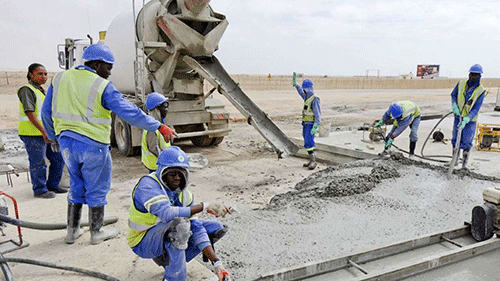The Collective Agreement negotiated between the Construction Industries Federation of Namibia (CIF) and Metal and Allied Workers Union (MANWU), signed on 28 May 2021, has now been published in the Government Gazette (No. 7675) of 2 November 2021.
This makes the conditions as stipulated in the Collective Agreement applicable and mandatory for everyone operating in the sector.
The Collective Agreement becomes effective on the date of promulgation.
The most significant change was the increase in the minimum wage payable, which is 2.6% for the first year, and 2.6% for the second year.
This increase comes at a time when there had been no increase since 2018.
The basis of the increase for the respective categories is the minimum wages as had been determined in the Government Gazette (No. 6567), dated 11 April 2018.
The current minimum wage payable in the industry as per the Government Gazette is, therefore, N$17.38 per hour.
Other benefits for employees in the sector, as per the employment categories listed in the Collective Agreement, include a service allowance equal to 150 hours on wages, which is to be paid as part of the December remuneration before the commencement of annual leave during December.
It is also mandatory that all employees, for whom minimum wages payable are prescribed as per the agreement, are registered by the employer with the Namibian Building Workers Pension Fund (NBWPF).
Alternatively, employers can offer pension and retirement benefits that provide for the same as the NBWPF, or indeed improved benefits.
Bärbel Kirchner, general manager of the CIF, said: “We are happy that our negotiated Collective Agreement for the construction sector has now been gazetted. This will ensure that there is a level playing field with regard to wages in our sector; it will minimise the impact of labour costs as a differentiating factor when bidding for contracts… We believe that the increase is within reason considering the current economic environment. It would simply make no sense to increase the minimum wage payable beyond the negotiated level, if employers canno longer afford an increase. There is a fine line to consider, where an increase can improve the livelihood of one, yet might lead to the retrenchment of another. From the CIF’s perspective, we feel, that at current times, we need to ensure that as many persons possible remain employed. Therefore, we think that since there had been no increase since 2018, that a 2.6% increase, is reasonable”.
Conditions for both the employer and the employee are expected to improve once the industry has been regulated through the establishment of a construction council and every effort has been made to optimise the procurement system in favour of maximum engagement of Namibian resources.
Kirchner noted the construction sector has seen large-scale retrenchments, but that with strategic intent by government and united, deliberate and conscious efforts, “we can work towards a turnaround and improve the performance of our sector to the benefit of our businesses and employees”.
Meanwhile, Justina–Jonas Emvula, secretary general of MANWU, said: ”The construction sector, since 2016, has been really under pressure; the workers persist to feel financial pressure as prices of basic needs, such as food and petrol continue increasing. Since 2018, no increase has been given to the workers – and looking at the situation of the pandemic we are in now, this increase is accepted by the workers with the view that it can make a difference – even though it may not address all the workers’ needs.
Emvula added that the construction sector has the potential to grow, and believes the sector has full capacity to perform any kind of work available.
She, however, expressed concern about projects not being awarded to local contractors, which she said is increasing high unemployment and precarious work in the sector.
“We, therefore, calling all contractors and their employees to collectively work together; we understand the frustration of lack of jobs, or jobs which are not sustainable – but this increase will make a difference, while we are busy to engage those in power to start prioritising local contractors and the immediate implementation of the Construction Council,” said Emvula.


